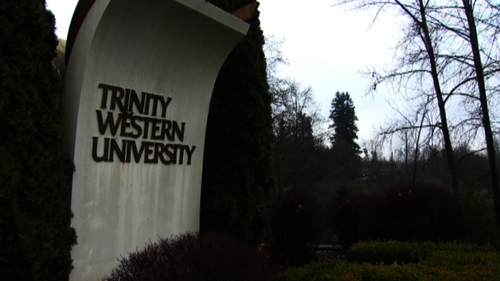Imagine the largest law society in Canada resorting to the worst faults of monopoly capitalism to score a political point. It’s a frightening prospect whether you regard it from the perspective of the law, politics or business. Yet it’s precisely what the Law Society of Upper Canada fell prey to with its recent vote to bar future graduates of Trinity Western University’s law school from practising their profession in Ontario. TWU is taking the threat so seriously, that it announced Tuesday it has launched legal action against the law society. Toronto lawyer Clayton Ruby, a harsh critic of TWU, is also involved in legal action to block its law school from opening in 2016. In the court of public opinion, criticism of the LSUC’s decision, as well as a similar decision by Nova Scotia’s law society, has focused on it being a violation of religious freedom. TWU is an evangelical Christian institution. The concern that prompted the law society action is the school’s so-called community covenant pledging students to engage in sexual activity only within monogamous, heterosexual marriage. It is understandable to see the controversy as strictly a religious-secular conflict. It’s easy to frame it as a divide between Christian moralism and the discriminatory prohibition of legally married homosexual Canadians from a law school to which they would otherwise be admitted. What gets lost in that perspective, however, is the means by which the Ontario and Nova Scotia law societies have chosen to press their case for their political ideal of inclusivity. It is a classic restraint of trade tactic to put a competitor out of business by using monopoly power to target its suppliers and customers. It is major league sports in the era before players’ associations and free agency. It is Microsoft when it declared users of its operating system could employ only its Explorer browser to connect to the Internet. Controlling the access point conditions every other choice. Consider a hypothetical Ontario student canvassing her options for law school. Her academic record is stellar. She’s socially conscious. She volunteers at food banks. No hint of homophobia mars her past. TWU interests her because she wants training in Christian traditions of the law. While she considers her sexual activity no one’s business, she can abide by the school’s community covenant until graduation. It’s no big deal. What is a big deal is that after graduation, she will be ineligible to practise law in her home province. She will have spent three years at a law school accredited by the B.C. Ministry of Advanced Education and the Canadian Federation of Law Societies. She will have signed a covenant that the Supreme Court of Canada has ruled is a perfectly legal and valid requirement for TWU to require as an evangelical Christian institution. Yet no lawyer’s jobs will be open to her in Ontario. She will not even be considered a lawyer in Ontario since the provincial law society has decided, a priori, to reject her for the school she attended. If she’s bright enough for law school, chances are she’ll weigh the costs and decide TWU simply isn’t worth the candle. Hello, McGill? UBC? Osgoode Hall? Multiply that decision over a decade, and you see the impact of the Law Society of Upper Canada’s vote. It’s the same restraint that oligopolistic sports owners imposed with iron will on generations of athletes, or that Bill Gates sought with the Internet Explorer gambit: You’ll come through me, as I want, if you want to get anywhere at all. The real end game, of course, is driving TWU’s law school out of business. In the great tradition of monopoly capitalists, the majority within both the Ontario and Nova Scotia law societies clearly believe their commitment to preserving the necessary order of the day gives moral justification to skirting or perhaps breaking the law. With actual capitalists, the necessary order is the preservation of pure profit at the expense of all others. In the case of the law societies, it is the preservation of a political order — treated as a given, although it is still very much contested — in which sexual rights trump freedom of religion, of conscience, of mobility, of association and all others. When capitalists try to corner any market, government agencies beat them back with legal sticks. Legions of lawyers, many members of the Law Society of Upper Canada, get into the act. And that, ultimately, is what’s so troubling about the LSUC’s — and its Nova Scotia counterpart’s — actions. It’s not just the underlying anti-religious — even anti-Christian — bigotry. It’s the disrespect for two laws. The first is for the law as settled by the Supreme Court of Canada. The second is for the law of supply and demand that is essential to a free, pluralistic society. Market manipulation is always frightful. When it’s the work of law societies claiming the high moral ground for their own political business, it’s actually something even worse. It’s shameful.

